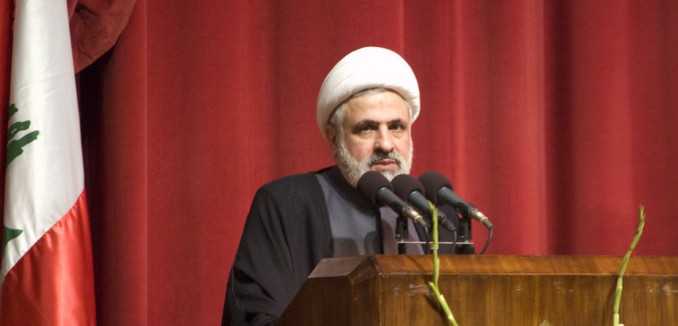A top Hezbollah official acknowledged that the Iran-backed terrorist group has been blocking the appointment of a new Lebanese president, Ya Libnan reported Sunday.
Hezbollah’s second-in-command Naim Qassem said that the Future Movement, a political party primarily supported by Lebanese Sunnis, must “end its hesitation” and support the Hezbollah-backed presidential candidate Michel Aoun, founder of the Free Patriotic Movement.
“The days have proved that there is a specific path for the presidency. Those who want to elect a president have only one route to take and it leads to General Michel Aoun,” Qassem said. “The global and regional powers, the Security Council and the Arab League will not be able to alter this course. They have been trying for two years to no avail,” he added.
On September 8, Lebanon’s parliament failed for the 44th time since 2014 to elect a new president. Hezbollah, and the Free Patriotic Movement it backs, refused to attend the sessions unless Aoun was guaranteed the victory, preventing parliament from having a quorum necessary for the vote. Qassem claimed that Hezbollah parliamentarians would stop boycotting the electoral sessions if, with the help of the Future Movement, they could vote Aoun into the presidency, Ya Libnan wrote.
Aoun and Suleiman Frangieh, the Maronite Christian leader of the Marada Movement, are considered the two top contenders for president. Frangieh is backed by the Future Movement, the Amal Movement, and the Progressive Socialist Party.
Despite Qassem’s claim that Hezbollah wants Aoun as president, Samir Geagea, who heads the Christian party Lebanese Forces, said on Saturday, “currently there is a difficulty to elect Aoun as president because Hezbollah does not want a president.”
Lebanon has had a national unity government since 2014. Hezbollah, which dominates the Lebanese political system, has consistently blocked the appointment of a new president ever since Michel Suleiman’s term expired in 2014.
Hezbollah’s obstruction of the domestic Lebanese political process comes as the Iranian proxy is preparing for another war with Israel. A report published by the Foundation for Defense of Democracies (FDD) in July noted that Israeli officials believe that any future war with Hezbollah has the potential to cause “thousands of civilian deaths” in Israel. (This past February, Hezbollah threatened to attack ammonium tanks in Haifa, which could kill tens of thousands of people.)
Jonathan Schanzer, vice president of research for FDD, explained that Hezbollah’s widely-reported tactic of hiding military assets in civilian areas will likely lead to mass casualties. Reports emerged two years ago that Hezbollah was offering reduced-price housing to Shi’ite families who allowed the terrorist group to store rocket launchers in their homes. An Israeli defense official told The New York Times in May 2015 that the buildup of Hezbollah’s terror infrastructure in southern Lebanese villages meant that “civilians are living in a military compound” and that their lives were at risk. A few days later, a newspaper linked to Hezbollah bolstered the Israeli assessment.
Sheikh Hassan Nasrallah, chief of Hezbollah, boasted in June that all of “its weapons and rockets” come from Iran. Nasrallah’s speech seems to confirm an assurance given to him last August by Iranian Foreign Minister Mohammad Javad Zarif that the nuclear deal presented “a historic opportunity” to confront Israel. Iran recently announced that its military spending would increase by 90% in the coming year.
Nasrallah’s comments also call into question assurances made by Secretary of State John Kerry that the U.S. would ensure that Iran could not arm Hezbollah, despite the lifting of nuclear sanctions against Tehran. “Our primary embargo is still in place,” Kerry said at a Senate hearing last year. “We are still sanctioning them. And, I might add, for those things that we may want to deal with because of their behavior, for instance, Hezbollah, there is a UN resolution, 1701, the prevents the transfer of any weapons to Hezbollah. That will continue and what we need to do is make sure that we’re enforcing it.”
While UN Security Council Resolution 1701, which was passed unanimously to end the 2006 war, forbids the arming of Hezbollah, Iran has continued to send the terrorist group weapons and the Security Council has refused to enforce it.
Qassem has acknowledged that there is no difference between Hezbollah’s political and military wings.
[Photo: FunkMonk / Wikimedia ]




